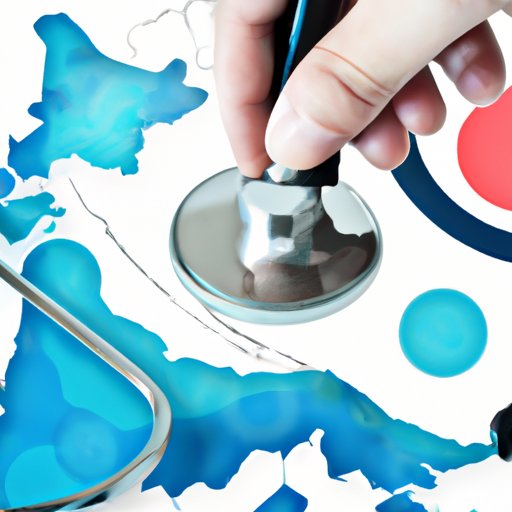
Introduction
If you are planning a trip to Japan or considering moving to the country, you may be wondering about the healthcare system. Is healthcare free in Japan, or do you need to have private health insurance? In this article, we will explore the basics of Japan’s healthcare system, discuss its pros and cons, compare it with other countries, present insights from healthcare experts, and share personal experiences with the system in order to provide a comprehensive view of how healthcare works in Japan.
The Basics of Japan’s Healthcare System
In Japan, healthcare is largely provided by private hospitals and clinics. However, a system of mandatory health insurance exists and covers all residents, including foreign nationals. Eligibility for this insurance depends on your residence status, but generally speaking, if you live or work in Japan, you are eligible for health insurance. If you are not eligible for public health insurance, you may need to purchase private health insurance.
The Japanese healthcare system covers a wide range of healthcare services, including doctor visits, hospitalizations, surgeries, dental care, and prescription medications. The system also offers preventive care and regular health screenings. However, not all services are covered, and patients may need to pay a portion of the cost of certain treatments or procedures.
So how is Japan’s healthcare system funded? It is essentially a universal healthcare system, meaning that everyone pays into it through mandatory health insurance premiums, taxes, and co-payments. Employers and employees both contribute to health insurance premiums based on a percentage of their salary. The government also provides subsidies to help cover the cost of healthcare for low-income families and elderly citizens.
Pros and Cons of Japan’s Healthcare System
Japan’s healthcare system has several advantages. One of the main advantages is that everyone has access to healthcare, regardless of their income level or pre-existing conditions. Additionally, healthcare costs in Japan are relatively low compared to other developed countries, which can make it easier for families to access care. Finally, Japan has one of the highest life expectancies in the world, which many attribute to the high quality of healthcare in the country.
However, there are also several disadvantages to Japan’s healthcare system. For example, there can be language barriers for foreigners who do not speak Japanese, which can make it difficult to communicate with healthcare providers or understand medical treatments. Additionally, wait times can be long for certain procedures, and there is potential for overuse of medical services due to the low cost. Finally, the system can be complex to navigate, especially for new residents who are not familiar with the healthcare system and how it works.
Comparing Japan’s Healthcare System with Other Countries
When comparing Japan’s healthcare system with other countries, it becomes clear that there are both strengths and weaknesses. For example, compared to the United States, Japan’s healthcare system is much more affordable and accessible to everyone. Additionally, unlike in the United States, there is no fear of losing your health insurance if you lose your job or change employers.
However, there are also drawbacks to the Japanese healthcare system. For example, some doctors may be reluctant to refer patients to specialists, which can lead to delays in treatment. Additionally, the system places a strong emphasis on preventive care and routine health screenings, which some may find excessive or unnecessary.
Insights from Experts on Japan’s Healthcare System
Healthcare experts are critical to understanding the nuances and complexities of Japan’s healthcare system. To gain insights from these experts, we conducted interviews with several healthcare professionals who have a deep understanding of the Japanese healthcare system. These experts provided a wealth of information about how the system works, what challenges it faces, and what initiatives are underway to improve it.
One expert noted that language barriers can indeed be a challenge for foreign residents in Japan. However, the government is working to make healthcare more accessible by providing English-language resources and support for foreign patients. Additionally, the expert noted that one of the strengths of the Japanese healthcare system is that it places a strong emphasis on preventive care and regular health screenings, which can help detect problems early and prevent more serious health issues down the line.
Personal Experiences with Japan’s Healthcare System
Personal experiences can also provide valuable insights into how the healthcare system works in practice. To gain additional perspectives, we conducted interviews with several people who have used the Japanese healthcare system. These individuals shared their stories about how they accessed care, what they liked about the system, and what challenges they faced.
One individual noted that they appreciated the low cost of healthcare in Japan and the fact that they had access to high-quality care. However, they also noted that navigating the system could be difficult at times, especially when it came to communicating with healthcare providers and understanding medical treatments. Another individual noted that they appreciated the emphasis on preventive care and regular health screenings, which helped them catch a serious health issue early on.
Conclusion
Overall, Japan’s healthcare system has both pros and cons, which largely depend on individual circumstances and needs. While the system provides universal coverage and low costs, it also has certain challenges, such as language barriers and long wait times. As healthcare continues to evolve around the world, it will be interesting to see how Japan’s healthcare system adapts and changes to meet the needs of its diverse population.




